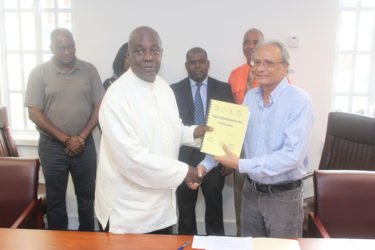The Commission of Inquiry (CoI) into the education system may have uncovered a case of fraud, as one Regional Education Department appears to be paying several phantom teachers.
When Minister of Education Rupert Roopnaraine received a copy of the preliminary report of the CoI yesterday, he was also told by CoI Chairman Ed Caesar that visits to schools in the Berbice River had turned up several “ghost teachers.”

Caesar, who once served as Chief Education Officer revealed, “We were in the Berbice River where we have seen pay sheets with names of teachers who don’t exist. We have seen ghost teachers even after we left a school call to say another name has been added to their pay sheet. The department must know who is on their payroll. We even observed one person being transferred from a school which doesn’t exist to another school.”
Responding to questions about this observation, the minister said, “This is a police matter. It is high fraud and it must be dealt with. It is beyond the powers of the Ministry of Education. It requires attention from those trained to investigate.”
However when Stabroek News asked the minister if or when the information compiled from the CoI would be forwarded to the police for action, Caesar offered a different plan of action.
According to Caesar the CoI believes that this is a matter for the Department of Education.
“The major issues relate to the Department of Education. We want them to look at those pay sheets in the Berbice River. We should give our Department of Education an opportunity to investigate before anything else is done,” he said.
Advisor to the minister on tertiary education Vincent Alexander then declared that the ministry would follow Caesar’s recommendation.
“The approach the ministry will take is to ask the department for specifics. We cannot ask for more in the absence of specifics,” Alexander said.
Caesar made the revelation while sharing some of the major findings of the CoI which began on April 23, 2016. He noted that Roopnaraine, who wanted to understand the status of education in the country, had tasked the CoI with determining “where we are and wherever possible make recommendations for improvement in the sector.”
It was important, he explained, that the commission understand some of the good things that have been happening in the sector and get a sense of how to move forward so that whatever is done in education is informed by evidential data. As such, 98 hearings were held with contributions being sourced from the 11 education districts. The submissions were classified under the subheadings of Administration, Infrastructure, Curriculum and Community Relations.
Among the complaints received about the administration of education across the country was that there seemed to be no link between the work of the Regional Education Office and the Regional Democratic Council (RDC).
“We must find a way to ensure that relations between regional administration and the education department is enhanced,” Caesar said, while noting that the commissioners have recommended each RDC establish an education committee.
This committee will relate to the education department thereby learning the educational needs of the region which the chair as the committee’s mouthpiece on the council will communicate.
He also noted that several Regional Education Officers (REdOs) seem not to understand their responsibilities and might require reorientation, even as he suggested a system of clear sanctions and disciplinary measures for REdOs be put in place.
“Unless there is in place a system of sanctions where people are removed or disciplined we’ll continue on this same road until even our grandchildren are education officers,” he stressed calling for an update of the desk manual and a reassessment of regional needs in relation to the number of education officers being assigned to districts. At present, the substantive number assigned to each region is inadequate.
The construction of schools also came in for criticism with both design and location proving to be unsatisfactory.
According to Caesar there needs to be a section of the ministry responsible for school design.
“When schools are to be built in the hinterland, people there who know about ventilation must be consulted,” he said giving as an example the St John the Baptist Primary school in Bartica
He noted that both sidewalls of the school have eight to nine fans and there were four fans behind the commissioners yet in minutes they were drenched in perspiration. Such an environment, he concluded, was not conducive to learning.
Additionally, he called for all schools built to be accessible to the physically challenged and constructed in a location convenient for the community they serve.
“We have schools where there are five students. That is not good enough,” he said, while adding that some of these schools have been named and not gazetted.
Finally in the area of curriculum, Caesar noted that many who participated in the hearings called for a reevaluation of the interactive Radio Instruction Programme and the introduction of indigenous languages into the early education system.
The final report of the CoI is expected to be submitted within three weeks once the commissioners are able to meet with Opposition Leader Bharrat Jagdeo and his team.
According to Caesar, they had reached out to the opposition for a meeting since December 20, 2016 but have been unable in the four months since then to set a date for a meeting.





